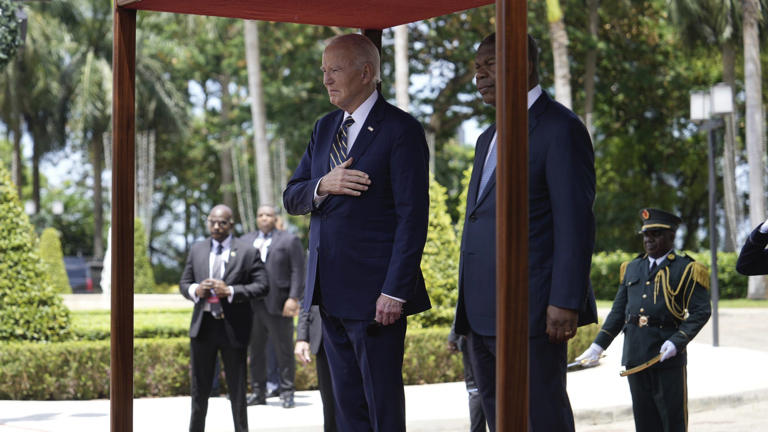
Charles Muchoki | Africa Guardian
President Joe Biden’s long-awaited trip to Angola, part of his final international tour as president, faced a series of challenges befitting the tumultuous backdrop of his administration. Initially postponed twice—first due to Middle East conflicts in 2023 and then catastrophic hurricanes in 2024—the visit finally materialized under stormy skies, both literal and political.
A Journey Marked by Symbolism and Resilience
On his first full day in Angola, torrential rains flooded Luanda’s poorly drained streets, nearly derailing the presidential convoy’s journey to the National Slavery Museum. Despite the challenges, Biden delivered his remarks from a podium dramatically set along the Atlantic coast, sunlight breaking through storm clouds as he reflected on Angola’s historical role in the Atlantic slave trade.
“It’s our duty to face our history—the good, the bad, and the ugly,” Biden said, acknowledging the enduring legacy of colonialism while emphasizing the importance of charting a brighter future for Angola and Africa as a whole.
Investing in Africa’s Future
Biden’s visit was more than a reflection on the past—it was a strategic effort to bolster Africa’s role in the global economy. With Africa projected to become the most populous continent by 2050, Biden reiterated the U.S. commitment to the region: “In many ways, Africa’s success will be the world’s success.”
The president announced $1 billion in humanitarian aid to assist Africans displaced by drought and extreme weather, a timely gesture amid the continent’s growing climate challenges. He also highlighted the U.S.-backed $4 billion Lobito Corridor project, aimed at connecting Angola, Zambia, and the Democratic Republic of Congo through improved rail and port infrastructure.
“We work together to mobilize more capital, to build more infrastructure, and to help Africa lead the way,” Biden said during his meeting with Angolan President João Lourenço.
Competing with China’s Influence
Critics dismissed the initiatives as a late attempt to rival China’s long-standing investments in Africa, which include extensive infrastructure projects across the continent. White House National Security spokesperson John Kirby defended the U.S. approach, stating, “It’s about [Angolans] catching up and keeping up and being more involved in bringing products to market.”
Notably absent from Biden’s remarks was any mention of an expanded U.S. military role in Angola, despite speculation about a possible base to counter Russia’s growing presence in Africa.
The Shadow of a Lame-Duck Presidency
Biden’s visit unfolded against the backdrop of his lame-duck status, with President-elect Donald Trump preparing to take office. Questions linger about how Trump, who never visited Africa during his first term and made disparaging remarks about some African nations, might handle U.S.-Africa relations.
Angolan President João Lourenço diplomatically expressed his willingness to work with any U.S. administration. Meanwhile, former Trump Africa envoy J. Peter Pham suggested that many of Biden’s initiatives could endure, particularly if they challenge China’s dominance, though he anticipated tougher scrutiny of U.S. investments under the new administration.
Hope Amid Uncertainty
On the final day of his trip, Biden visited the Lobito rail hub and participated in a regional roundtable, demonstrating his commitment to the ambitious infrastructure project. However, his visibly weary demeanor underscored the toll of his presidency and the symbolic weight of this “global finale.”
For many Angolans, Biden’s visit was a hopeful moment despite the challenges. “Just the fact that an American president is coming to Angola is a good thing,” one Luanda resident remarked.
As Biden bids farewell to the global stage, the true test will be whether the investments and partnerships he championed deliver tangible benefits to Angola’s young, ambitious population or remain confined to the elite circles of the oil-rich nation. Despite the hurdles, many in Angola are cautiously optimistic about the future.
___
